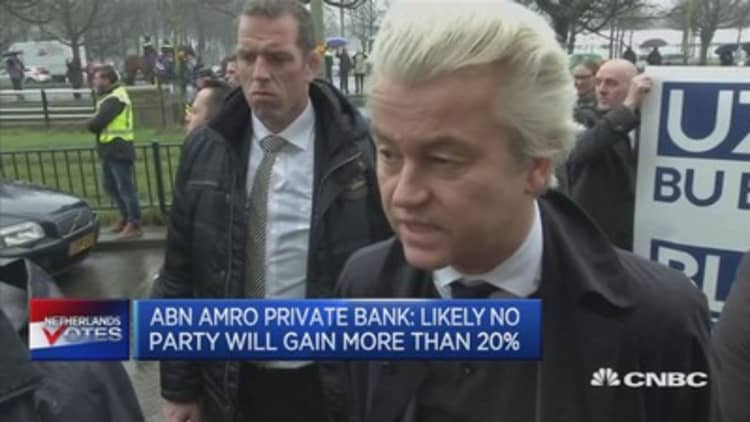
Months of spin and political rhetoric will culminate in Dutch voters heading to the polls this week, with investors contemplating what the general election could mean for their portfolios.
Using hedge fund analytics tool Kensho, CNBC conducted a study to show how stock indexes in Europe perform following Dutch elections. The data shows the average return following 11 different elections in the Netherlands, which date back to the early 1980s.
The figures show that the AEX index, which was derived from Amsterdam Exchange index in 1983 and is composed of 25 securities, usually falls in the two sessions immediately after a general election. The data also show that it has traded negatively for 56 percent of the time and has an average return of -0.31 percent.
Rival benchmarks in Belgium and Germany also traditionally follow the AEX lower, the historical data shows, although the French CAC 40 and the U.K.'s FTSE 100 are largely unaffected.
Meanwhile in the currency markets, Kensho data shows that Dutch elections can provide a fillip for foreign exchange crosses in the region. Over the five previous Dutch general elections since 2000, both the euro-U.S. dollar cross and the sterling-U.S. dollar cross have traded positive 100 percent of the time on the day of these elections.
Although this historical data might inform this week's trades, it's worth noting that the wave of populism across the Western world is likely to complicate matters this time around. Geert Wilders, who has been called the Netherlands' Donald Trump, has seen early momentum ease off but his Party for Freedom is still poised to secure the second-largest number of seats in parliament.
Nonetheless, Mary Pieterse-Bloem, the global head of fixed income at ABN AMRO Private Bank, told CNBC Monday that investors are not "running scared at all" from Dutch assets.
"With respect to the Netherlands, I don't think there is all that much to fear in respect to the Dutch government bonds," she said, adding that their scarcity would add to their attractiveness as part of a wider portfolio.
She added that, more generally, ABN AMRO is advising clients to be "underweight" bonds in a larger cross-asset allocation and have a small "overweight" on equities.
CNBC's parent NBCUniversal is a minority investor in Kensho.


